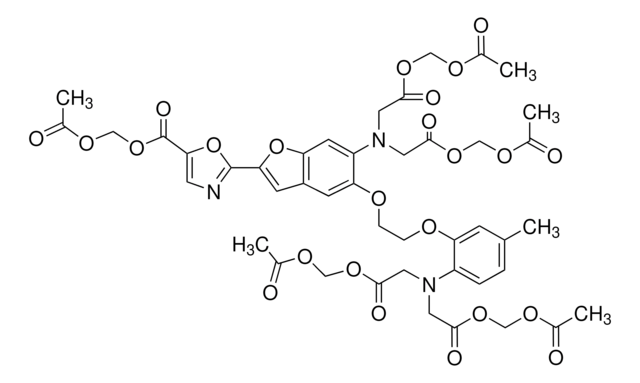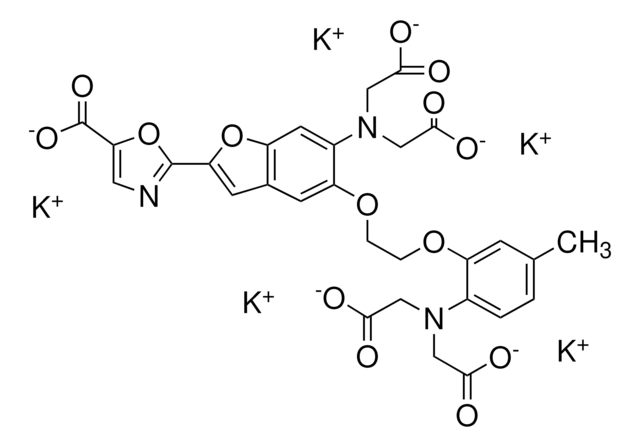46393
Fluo-3
suitable for fluorescence, ~70%
Synonyme(s) :
4-(2,7-Dichloro-6-hydroxy-3-oxo-9-xanthenyl)-4′-methyl-2,2′-(ethylenedioxy)dianiline-N,N,N′,N′-tetraacetic acid
About This Item
Produits recommandés
Essai
~70%
Niveau de qualité
Forme
solid
Solubilité
H2O: soluble
Fluorescence
λex 506 nm; λem 526 nm in 0.1 M Tris pH 8.0, esterase 30 mM Ca2+
Adéquation
suitable for fluorescence
Température de stockage
−20°C
Chaîne SMILES
Cc1ccc(N(CC(O)=O)CC(O)=O)c(OCCOc2cc(ccc2N(CC(O)=O)CC(O)=O)C3=C4C=C(Cl)C(=O)C=C4Oc5cc(O)c(Cl)cc35)c1
InChI
1S/C36H30Cl2N2O13/c1-18-2-4-24(39(14-32(43)44)15-33(45)46)30(8-18)51-6-7-52-31-9-19(3-5-25(31)40(16-34(47)48)17-35(49)50)36-20-10-22(37)26(41)12-28(20)53-29-13-27(42)23(38)11-21(29)36/h2-5,8-13,41H,6-7,14-17H2,1H3,(H,43,44)(H,45,46)(H,47,48)(H,49,50)
Clé InChI
OZLGRUXZXMRXGP-UHFFFAOYSA-N
Application
Autres remarques
Code de la classe de stockage
11 - Combustible Solids
Classe de danger pour l'eau (WGK)
WGK 3
Point d'éclair (°F)
Not applicable
Point d'éclair (°C)
Not applicable
Équipement de protection individuelle
Eyeshields, Gloves, type N95 (US)
Faites votre choix parmi les versions les plus récentes :
Déjà en possession de ce produit ?
Retrouvez la documentation relative aux produits que vous avez récemment achetés dans la Bibliothèque de documents.
Notre équipe de scientifiques dispose d'une expérience dans tous les secteurs de la recherche, notamment en sciences de la vie, science des matériaux, synthèse chimique, chromatographie, analyse et dans de nombreux autres domaines..
Contacter notre Service technique






